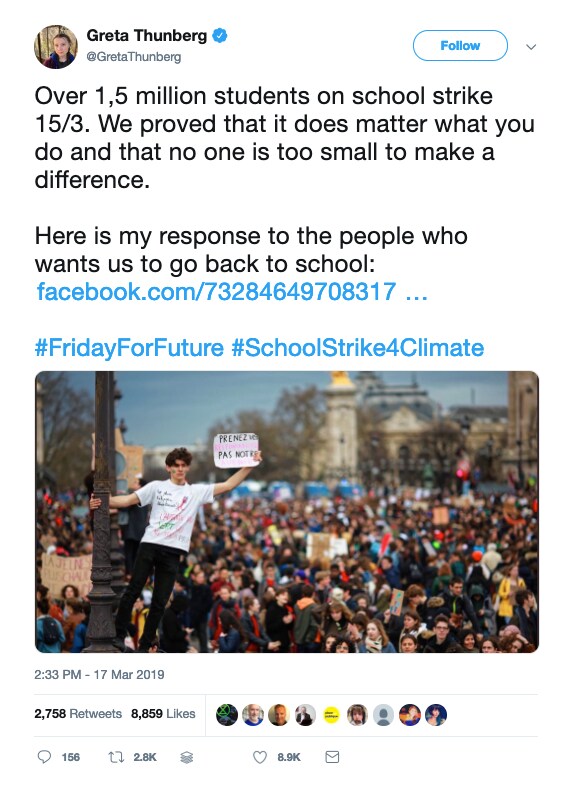From Sweden to India, school climate strikes have gone global

"Time is running out." Image: REUTERS/Gonzalo Fuentes
An estimated 1.5 million school students worldwide turned their back on lessons last week to stage the biggest wave of climate strikes since the protests began.

The climate strike movement was inspired by Greta Thunberg, a 16-year-old Swedish climate activist and Nobel Peace Prize nominee. Last year, she announced she would go on strike every Friday until the government in Stockholm took steps to guard against climate change.
Her uncompromising speech at January’s World Economic Forum Annual Meeting in Davos catapulted her and the movement into the global spotlight: “I often hear adults say: ‘We need to give the next generation hope’,” she said. “But I don’t want your hope. I want you to panic. I want you to feel the fear I do. Every day. And want you to act. I want you to behave like our house is on fire. Because it is.”

From Sweden to Australia, from the USA to India, strikes took place in more than 2,000 cities across more than 100 countries. Many parents and even schools have given their support to the strikers, along with organizations like Greenpeace and public figures such as US Senator Bernie Sanders. But the reaction hasn’t been unanimously positive.

Australian finance minister Mathias Cormann was blunt in his criticism of the movement. "During the school time kids should be in school,” he said, before expressing the view that the school strikes had been hijacked by adult activists. "Australians will take a very cynical view of professional adult activists using and abusing kids for their purposes during school time,” he added.
The strikers are calling for a global state of climate emergency to be declared and for the views of younger people to be properly listened to by governments.
The financial costs of climate change are already being felt. Between now and the end of the century, an estimated $43 trillion of losses could be generated by climate change and extreme weather events. Climate change is also contributing to a loss of biodiversity, which is putting global food production in jeopardy, and is expected to cause an additional 250,000 deaths per year between 2030 and 2050.
Don't miss any update on this topic
Create a free account and access your personalized content collection with our latest publications and analyses.
License and Republishing
World Economic Forum articles may be republished in accordance with the Creative Commons Attribution-NonCommercial-NoDerivatives 4.0 International Public License, and in accordance with our Terms of Use.
The views expressed in this article are those of the author alone and not the World Economic Forum.
Stay up to date:
Future of the Environment
Forum Stories newsletter
Bringing you weekly curated insights and analysis on the global issues that matter.
More on Nature and BiodiversitySee all
Dr Gideon Lapidoth and Madeleine North
November 17, 2025






